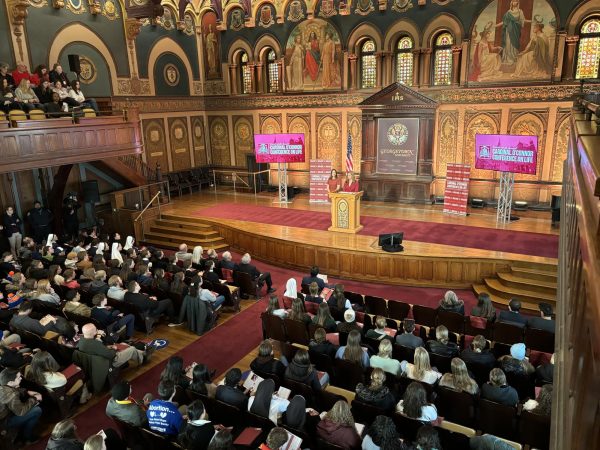Activists gathered at Georgetown University for the twenty-sixth annual Cardinal O’Connor Conference on Life (OCC), the largest student-led anti-abortion conference in the United States, Jan. 25.
This year’s conference, titled “Life and Dignity: A Global Commitment,” aimed to illuminate international perspectives against abortion. Lila Rose, an anti-abortion activist and podcast host, headlined the conference, which also featured panelists Melissa Ohden, director of the Abortion Survivors Network, which supports individuals born despite an attempted abortion, and Brian Clowes, director of education and research at Human Life International, a Catholic anti-abortion advocacy organization.

Maria Victoria Almeida Vazquez (SFS ’25), director of this year’s OCC, said the conference’s organizers sought to platform a diverse panel of voices during the conference, including academics, activists and religious leaders.
“The presence of these different voices at the OCC is proof that the pro-life movement isn’t owned by any single group — it belongs to all of those who believe in the dignity of every human life and feel a strong conviction to defend life from the culture of death,” Almeida Vazquez wrote to The Hoya.
During her keynote speech, Rose encouraged students to take action against pro-abortion media narratives and shared her experiences as an anti-abortion activist in Washington, D.C.
Rose said she feels anti-abortion politicians have restrained themselves from defunding organizations that offer abortion care because they are scared of possible media narratives.
“What I was beginning to see more and more clearly was the power, the absolute power of media, the absolute power of a message, the absolute power of narrative, to not only shape hearts and minds, but to direct control over the whole entire political proceedings that happen in this country,” Rose said at the event. “It made me more determined than ever that we had to not just fight the media war, but we had to discover and employ the tactics and strategies to win the media war.”
Members of Georgetown Right to Life, the university’s officially recognized anti-abortion organization, and the Knights of Columbus, a Catholic men’s group, organized the conference, with the university sponsoring it and Robert M. Groves, the school’s interim president, speaking.
Maria Rodriguez Brannon, a student at the University of Mary in Bismarck, N.D., who attended the conference along with over 300 of her classmates, said that she was impressed by Georgetown’s involvement in OCC.
“I was first taken aback by how beautiful the college is and how important it is for us to have historic institutions involved in this work,” Rodriguez Brannon told The Hoya. “I think it’s also just really good to be in contact with other colleges and other students. It gives me hope of the work that can still be done.”
During the conference, student organizers presented the Rev. Thomas King, S.J. Award, which recognizes collegiate student groups’ anti-abortion advocacy, to Ravens Respect Life, an anti-abortion student group at Benedictine College in Atchison, Kan.
Groves said the award reflects the legacy King, a Jesuit educator, left at Georgetown.
“He was a reassuring presence. He was a mentor, a spiritual guide, a teacher, and it’s no surprise that in 1999 at the end of that century, he was named Georgetown’s man of the century,” Groves said at the conference. “He provided an enduring example of how to pursue important scholarly questions, how to live one’s faith and how to care for the most vulnerable.”
During the week surrounding the conference, pro-abortion organizations including H*yas for Choice (HFC), a student organization that advocates for reproductive rights and which the university does not officially recognize, hosted a week-long series of events to counter the OCC.
HFC collaborated with GU Pride, a university-recognized student group centering LGBTQ+ students, to host a bracelet-making event and invited Catholics for Choice, a non-Georgetown affiliated Catholic organization that advocates for reproductive rights, to discuss the role of the pro-abortion movement within Catholicism. HFC also organized a screening of “The Janes,” a movie that follows a group of women who defied the Illinois state legislature’s ban on abortion.
Stella Linn (CAS ’27), the HFC co-president, said the events were meant to build a pro-abortion community on campus ahead of the conference.
“We wanted to do a mix of informational, more serious events with more feel-good, community-building events, because it is so emotionally taxing as a student at Georgetown to see the school do this,” Linn told The Hoya.
Wassan Abdelkarim (CAS ’28) said Georgetown’s support of the OCC contrasts with the majority opinion on campus.
“Even though the university says they don’t really support either side, it says a lot,” Abdelkarim told The Hoya. “Especially as a university with so many students who are obviously pro-choice, I think it’s just very messed up to say the least.”
Linn said the university’s support of an anti-abortion conference makes pro-abortion students feel the administration does not support them.
“It’s really disheartening, especially if you do two seconds more of research, into the speakers or the conference itself, you see how atrocious it is to so many groups of people supporting it,” Linn said. “Knowing that our university’s funding is going towards it, you just feel so unsupported by the university already. It does not make me proud to be a Georgetown student, that’s for sure.”
Almeida Vazquez said she feels students can benefit from reconsidering the anti-abortion movement’s interests beyond organizing against abortion access.
“There are so many ways to stand for life, and we welcome every heart that is willing to walk this journey with us,” Almeida Vazquez wrote.
Abdelkarim said she feels that Georgetown uses its status as a Catholic and Jesuit institution to rationalize its funding of OCC, while declining to fund pro-abortion rights organizations like HFC.
“We’re a Catholic, Jesuit university, which I think that’s how Georgetown justifies funding the conference,” Abdelkarim said. “Students need to know that even though we are a Catholic, Jesuit university, we still care about people, and I don’t think that pro-lifers think about that very much.”